- Home
- Introduction, Update Information, Links
- The Super Seventies "Classic 500"
- Readers' Favorite Seventies Albums
- Seventies Single Spotlight
- The Top 100 Seventies Singles
- Favorite Seventies Artists In The News
- Seventies Almanac - Year By Year
- Seventies Singles - Month By Month
- Seventies Albums - Month By Month
- Seventies Daily Music Chronicle
- Seventies Superstars In Their Own Words
- The Super Seventies Archives
- Seventies Trivia Quizzes & Games
- Seventies MIDI Jukebox
- The Super Seventies Bookstore
- The Super Seventies Photo Gallery
- Seventies' Greatest Album Covers
- Popular Seventies Movies & TV
- Seventies Celebrity Portrait Gallery
- Seventies Lyrics Hit Parade
- Top Seventies Artist Music Videos
- Seventies Usenet Music Forums
- Seventies Smiley Calendar
- EXTRA!
- Superseventies.com Facebook Page
- Superseventies.com Reddit Discussions
- The Super Seventies Blog
- Tweet The Seventies
- RockSite InfoBank
- Beatlefan Site
- Thanks For Your Support! / Top Sellers
- Search The Rock Site/ The Web
![]()
Blaxploitation soundtracks are no longer getting the shaft.
by Elvis Mitchell
in Esquire
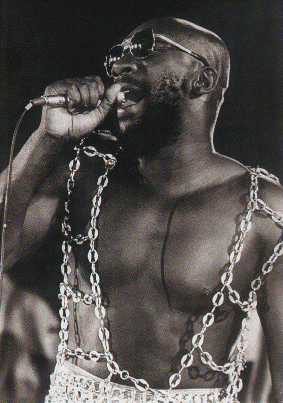
![]() he Best of Shaft
may sound like the punch line of some long-forgotten joke to most people, a joke in which barking guitars with wahwah pedals cranked up to eleven must figure prominently. But Best
happens to be one of the most listenable CDs of 1999, a compilation that brings together material from Isaac Hayes's Shaft
soundtrack
and Johnny Pate's Shaft in Africa
score.
he Best of Shaft
may sound like the punch line of some long-forgotten joke to most people, a joke in which barking guitars with wahwah pedals cranked up to eleven must figure prominently. But Best
happens to be one of the most listenable CDs of 1999, a compilation that brings together material from Isaac Hayes's Shaft
soundtrack
and Johnny Pate's Shaft in Africa
score. 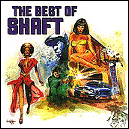 As Robert Towne wrote in Chinatown,
"Whores, bankers, and ugly buildings all become respectable if they last long enough," and if you've been hitting any underground parties or raves -- the cultural phenomenon that disproved the truism that white girls can't dance -- or listening to the increasing number of shrewdly programmed black-music radio shows turning up around the country (most notable Garth Trinidad's "Chocolate City" on Santa Monica station KCRW), then you've probably blissed out to the lounge funk of Hayes's "Cafe Regio's."
As Robert Towne wrote in Chinatown,
"Whores, bankers, and ugly buildings all become respectable if they last long enough," and if you've been hitting any underground parties or raves -- the cultural phenomenon that disproved the truism that white girls can't dance -- or listening to the increasing number of shrewdly programmed black-music radio shows turning up around the country (most notable Garth Trinidad's "Chocolate City" on Santa Monica station KCRW), then you've probably blissed out to the lounge funk of Hayes's "Cafe Regio's."
Music from the black action films of the seventies -- films that were lumped into the vaguely condescending category of "blaxploitation" by the NAACP in Variety in 1972 -- has now gone from being inescapable to inevitable. And it makes sense that this idiom would get caught in the tongue-in-cheek crosshairs of retro, the circle where major designers turn seventies castaways into cutting-edge chic. It was both Brits and rappers who saw the value in the dead-on-it funk, and they had surreptitiously been slipping samples from these scores for years. You don't need to be a mix-master prodigy to recognize that the blaxploitation beat lends itself to bumping on the dance floor.
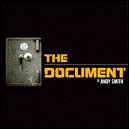 Nothing has done more to bring the music new attention than The Document,
a nimble-minded collection of dance-floor music and proto techno funk from Portishead mainstay DJ Andy Smith. He deftly mixes cuts from the two soundtracks, Marvin Gaye's Trouble Man
(one of the best and most underrecognized scores) and Barry White's Together Brothers
(one of the oddest and most underplayed).
Nothing has done more to bring the music new attention than The Document,
a nimble-minded collection of dance-floor music and proto techno funk from Portishead mainstay DJ Andy Smith. He deftly mixes cuts from the two soundtracks, Marvin Gaye's Trouble Man
(one of the best and most underrecognized scores) and Barry White's Together Brothers
(one of the oddest and most underplayed).
But the most inspired use of music from such soundtracks is on a series of import collections from Global Records called, simply enough, Blaxploitation.
On these five compilations, the producers bring together songs for an ideal, a nonexistent blaxploitation movie of the mind, with beautiful shifts of mood coming from "Theme from Shaft,"
"Superfly," and "Give Me Your Love," as well as from songs never before collected on CD, like the stark-raving mad, cool cover of "Summer in the City" sung by Valerie Simpson, even though it's credited to Quincy Jones. The song can also be found on Jones's You've Got It Bad Girl
LP, which belongs in the good-luck-finding-it category. 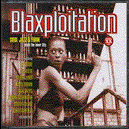 It has yet to be released on CD, though it was sampled by the Pharcyde, among others. (For completists who want blaxploitation music as yet unavailable on CD, vinyl is still the way to go. Footlight Records in Manhattan specializes in soundtracks of all sorts, and for your back-in-the-day R&B needs, there is the comprehensive vinyl store Record Finders in Los Angeles, where rappers and Euro technocrats do their shopping.) There are also songs that have never been used in black movies but should've been, like Billy Paul's "Am I Black Enough for You," which may have been inspired by a line from the seminal blaxploitation film Cotton Comes to Harlem,
Ossie Davis's lovable adaptation of Chester Himes's feral novel.
It has yet to be released on CD, though it was sampled by the Pharcyde, among others. (For completists who want blaxploitation music as yet unavailable on CD, vinyl is still the way to go. Footlight Records in Manhattan specializes in soundtracks of all sorts, and for your back-in-the-day R&B needs, there is the comprehensive vinyl store Record Finders in Los Angeles, where rappers and Euro technocrats do their shopping.) There are also songs that have never been used in black movies but should've been, like Billy Paul's "Am I Black Enough for You," which may have been inspired by a line from the seminal blaxploitation film Cotton Comes to Harlem,
Ossie Davis's lovable adaptation of Chester Himes's feral novel.
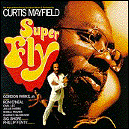 Pauline Kael wrote that The Godfather Part II
was the first movie to say no in thunder. She could've said the same thing about Curtis Mayfield's Superfly
soundtrack
. A seductive and rhythmic counterpoint to the picture's message about ripping off the Man -- and what blaxploitation picture isn't down with such a sentiment? -- Mayfield's score rebels against the movie's insidious mythologizing of a predatory drug dealer named Priest. Mayfield led his band through a rough and bluesy rendition of the title song and seemed to understand the unspoken dynamic of the movies of the era: This might be the only chance African-Americans got to redress decades of second-class imagery on the big screen and speak to the issues of the day. Liberal critics of the time, who went out of their way to attack the images that blaxploitation portrayed, seemed to miss the point that audiences picked up on so quickly -- that Shaft and his brothers offered a bemused and ironic contrast to everything that had come before.
Pauline Kael wrote that The Godfather Part II
was the first movie to say no in thunder. She could've said the same thing about Curtis Mayfield's Superfly
soundtrack
. A seductive and rhythmic counterpoint to the picture's message about ripping off the Man -- and what blaxploitation picture isn't down with such a sentiment? -- Mayfield's score rebels against the movie's insidious mythologizing of a predatory drug dealer named Priest. Mayfield led his band through a rough and bluesy rendition of the title song and seemed to understand the unspoken dynamic of the movies of the era: This might be the only chance African-Americans got to redress decades of second-class imagery on the big screen and speak to the issues of the day. Liberal critics of the time, who went out of their way to attack the images that blaxploitation portrayed, seemed to miss the point that audiences picked up on so quickly -- that Shaft and his brothers offered a bemused and ironic contrast to everything that had come before.
The genre gave the cream of seventies R&B artists a way to change the scope of their compositions and respond to the newfound heroism and sexual boldness finally granted to African-American actors. The curdled hostility in Bobby Womack's "Across 110th Street" (later borrowed by Quentin Tarantino for Jackie Brown ) recalls the freshets of hope and volatility of an earlier era. War's "City, Country, City" is an extraordinary, expansive, free-form jam that was originally composed for the revisionist black western The Legend of Nigger Charley, starring Fred Williamson, a man for whom every year still seems to be 1973. (The song eventually turned up on The World Is A Ghetto. The original scores themselves often felt rushed, crackling like underdeveloped demos. The soundtrack albums gave the audiences who devoured the films a chance to hear the final, polished versions of the scores.)
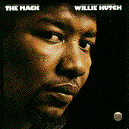 A few years back, directors Allen and Albert Hughes used Hayes's 1969 cover of "Walk On By," the sprightly Burt Bacharach weepie that Hayes cloaked in a layer of urbane gloom, to create a memorable trailer for their movie Dead Presidents.
Even if the picture itself didn't quite manage to live up to the existential heartbreak of Hayes's music, the Hughes brothers recognized what it was that originally brought Hayes to the attention of Shaft
director Gordon Parks and producer Joel Freeman: His suave mastery of the contradictory elements of funk and melancholy -- ghetto swing -- was made for the movies. There aren't many better film moments than the magisterial horns alternating with the close-to-the-ground guitar as the authoritative hi-hat goes on and on in "Theme from Shaft," a song that has survived the evolution from groundbreaker to cultural laugh line to singular standard.
A few years back, directors Allen and Albert Hughes used Hayes's 1969 cover of "Walk On By," the sprightly Burt Bacharach weepie that Hayes cloaked in a layer of urbane gloom, to create a memorable trailer for their movie Dead Presidents.
Even if the picture itself didn't quite manage to live up to the existential heartbreak of Hayes's music, the Hughes brothers recognized what it was that originally brought Hayes to the attention of Shaft
director Gordon Parks and producer Joel Freeman: His suave mastery of the contradictory elements of funk and melancholy -- ghetto swing -- was made for the movies. There aren't many better film moments than the magisterial horns alternating with the close-to-the-ground guitar as the authoritative hi-hat goes on and on in "Theme from Shaft," a song that has survived the evolution from groundbreaker to cultural laugh line to singular standard.
Not all filmmakers have been so reverent. Songs from these soundtracks turn up in movies that exploit them as jokes (like the use of "Pusherman" in The Cable Guy ). And shoplifting the street telegraphy of "Brother's Gonna Work It Out" from Willie Hutch's The Mack soundtrack a few years ago, the lunkheaded Brit beat-homage collective Chemical Brothers were derisive about the original composition and the record, which they presumably picked up somewhere very cheaply. But long after the Chemical Brothers are fodder for an Adam Sandler soundtrack that pays tribute to the nineties -- The Wedding Singer, Too? -- the heart-in-its-throat excitement of Hutch's score will still have the feel of urban journalism.
Like all of the best soundtracks for the seventies black action movies, The Mack
worked both as music and as activist commentary on the period. They were the precursors of rap, which Chuck D famously referred to as the CNN of black America. The intensity of pride these movies triggered became the abandoned ground upon which rappers went to work.
![]() Reader's Comments
Reader's Comments
No comments so far, be the first to comment .
![]() Best of EXTRA!
| EXTRA!
| Main Page
| Seventies Single Spotlight
| Search The RockSite/The Web
Best of EXTRA!
| EXTRA!
| Main Page
| Seventies Single Spotlight
| Search The RockSite/The Web


